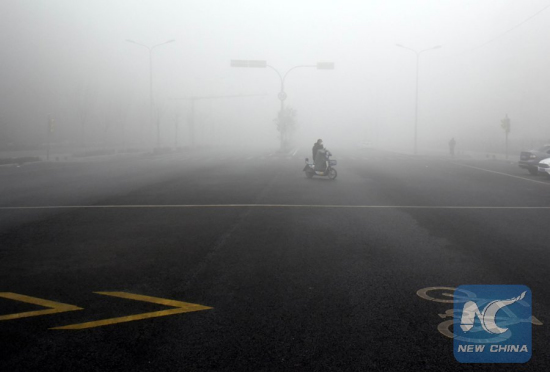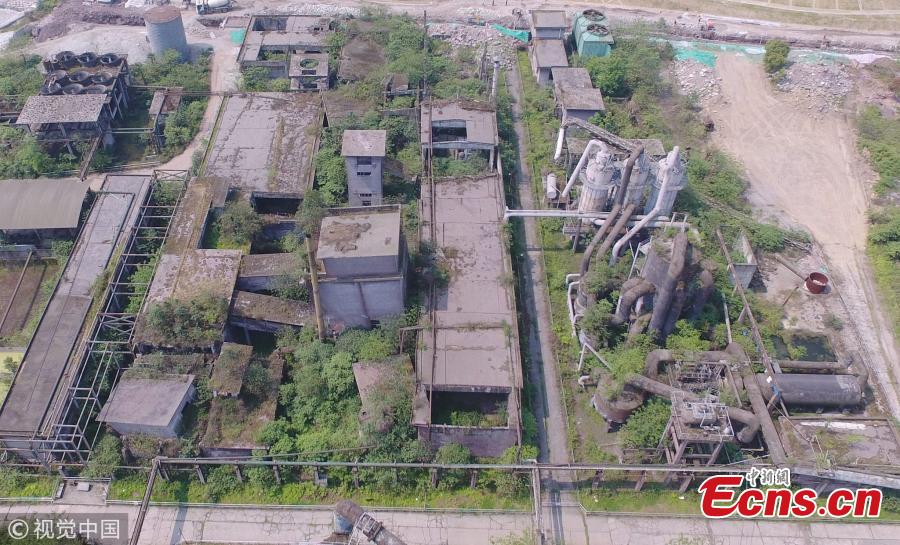
File Photo: A man rides in heavy fog and haze in Jinan City, capital of east China's Shandong Province, Jan. 4, 2017. The provincial meteorological observatory issued a red alert for fog and extended its orange alert for smog on the day. (Xinhua/Zhu Zheng)
An American team of economists and atmospheric scientists reported that by meeting its greenhouse gas-reduction goals, China will experience air quality and health benefits with associated monetary savings that could offset the total cost of implementing the climate policy.
A new study, published on Monday in Nature Climate Change, estimated fewer deaths from air pollution means a 339 billion U.S. dollars savings in 2030 that could be about four times what it would cost China to meet its climate goals.
"The country could actually come out net positive, just based on the health co-benefits associated with air quality improvements, relative to the cost of a climate policy," said study co-author Noelle Eckley Selin, an associate professor in Massachusetts Institute of Technology's Institute (MIT) for Data, Systems, and Society.
The study was led by Selin and Valerie Karplus, an economist in MIT's Sloan School of Management.
China has pledged to reduce domestic carbon dioxide emissions in an international effort to keep global temperatures from rising more than 2 degrees Celsius above preindustrial levels, as part of the 2015 Paris Agreement on climate change.
The team developed a new modeling approach which combines an energy-economic model called the China Regional Energy Model (C-REM) with GEOS-Chem, an atmospheric chemistry model.
C-REM models China's economy and energy system at a provincial level, and the researchers used the model to simulate how a given climate policy changes a province's economic activity, energy use, and emissions of carbon dioxide and air pollutants.
They ran simulations under four stringency scenarios: a no-policy, business-as-usual scenario; and three different policy scenarios that aimed to reduce carbon dioxide emissions by three, four, and five percent per year, respectively, through 2030.
The four percent scenario is in line with China's pledge to reach peak carbon dioxide emissions before 2030 under the Paris Agreement.
The team then plugged the results of each scenario into the GEOS-Chem model, which simulates how the various emissions and pollutants produced by C-REM combine in the atmosphere to form particulate matter province by province.
They overlayed this map of particulate concentrations onto population maps to calculate the amount of pollution that communities are breathing in, then consulted epidemiological literature to determine the number of avoided deaths that would occur, based on a province's exposure to a certain amount of pollution.
Finally, the researchers calculated the economic value of these deaths using standard methods, and compared this with the total cost of implementing a given policy scenario.
In sum, the team found that, under a no-policy scenario, China would suffer more than 2.3 million premature, pollution-related deaths by 2030.
If the country adopts a climate policy to reduce emissions by three, four, or five percent per year, it would avoid 36,000, 94,000, and 160,000 premature deaths, respectively.
After converting each scenario's health co-benefits into a monetary value, the team found that, compared to the total cost of implementing a three, four, or five percent per year policy, the savings gained as a result of health co-benefits equals 138.4 billion, 339.6 billion, and 534.8 billion dollars, respectively.
In the four percent scenario, which is most in line with China's actual climate pledge, a net co-benefit of 339.6 billion dollars would be about four times the cost of implementing the policy itself.
Selin and Karplus say that, in China's case, improvements to air quality and human health would increase with more stringent climate policies, mainly because the country's energy is so heavily reliant on coal.
"In China, as you go to tighter and tighter climate policies, you continue to reduce pollutant emissions from coal, whereas the U.S. has already reduced a lot of its air pollution from coal through end-of-pipe technologies," Karplus said.
"The incremental reductions you're taking are coming from a fuel with a very high carbon content, which is also the major source of air pollution."
The team stresses that a climate policy alone will not solve any country's air pollution problems. However, the study shows that significant reductions in greenhouse gas emissions will result in better air quality, compared to continuing along on a business-as-usual path.
"This is really a sustainability story," Selin says. "We have all these policy goals for a transition toward a more sustainable society. Mitigating air pollution, a leading cause of death, is one of them, and avoiding dangerous climate change is another."


















































